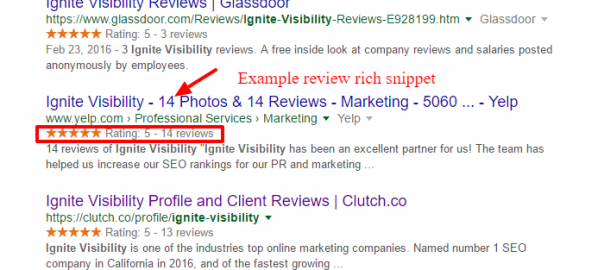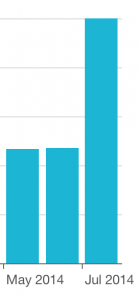You might have heard that Google recently updated the guidelines for rich snippet reviews. If you’re someone who includes marked-up reviews on your website, the changes could have a direct impact on your SEO efforts.
Some people got new rich snippet reviews stars in Google as a result of the change. Others lost them.
If you lost your review stars in Google, this post will help you figure out why.

Rich snippet reviews
Rich snippet reviews are reviews that webmasters include on their website as social proof.
Review sites like Yelp and Clutch.co use them, but also people markup their own sites, products, etc.
They’re called “rich snippet” reviews because they follow the specifications of schema.org markup. In other words, the reviews themselves are identified with a bit of code and not just simple text.
The markup allows search engines to identify reviews on websites and include them in the search engine results pages (SERPs). The end result is a search listing that includes a review about the business.
Rich snippet reviews help click through rate, they increase credibility and are indicators of a websites overall review quality.
The New Changes
Google, as you might have heard, is obsessed with ensuring that its users receive the best possible experience when searching for words and phrases. That’s why the company is cracking down on reviews that aren’t helpful. They are also looking at reviews that do not meet a certain quality threshold.
I will explain…
There is a new set of guidelines in place that webmasters must follow if they want their reviews to appear in the search results.
Website owners who don’t follow the rules won’t be delisted completely, but any marked-up reviews on the site won’t show up in the SERPs. In a nutshell, that means the website will have no review stars in Google.
Let’s take a look at each of the new rules individually.

Reviews Must Be Independent
For starters, your reviews have to be independent.
In other words, you can’t write the reviews yourself and they cannot be anonymous. They have to be written by customers who’ve used your product or service.
There’s an exception to that rule, though. If the review is a “genuine, independent, unpaid editorial review,” then you can include it on your site.
The best way to comply with this rule is to provide a place on your site where customers can review what you’re offering. Give them the opportunity to rate your business on a scale of 1-5 and also allow them to write a brief testimonial.
Take the Good With the Bad
Don’t shoot the messenger, but Google requires you to include all reviews on your site. That includes bad reviews as well as good ones.
Obviously, it’s not very good social proof if people search for keywords related to your business, find your listing on the first page, and see a negative review associated with it.
The way to combat that, of course, is to offer outstanding customer service so that people don’t leave low marks on your site.
For those bad reviewers who do slip through the cracks, though, Google prohibits you from filtering out their feedback.
There are many ways to get rid of bad reviews, but I will save that for another post.
No Robots
The reviews on your site must be authored by actual human beings. They can’t be based on template sentences created by software.
For example, this isn’t acceptable: “4 out 5 customers give us 5 stars!”
While that might be totally accurate, and you’re certainly welcome to include it on your site, it shouldn’t be featured in a review snippet.
The bottom line here is that you don’t want some bot that crunched through your analytics to write a review of your business. All reviews must be written by living, breathing people.
It’s Not All for One
If you operate a number of franchises or a business with multiple locations, your marked-up reviews must be specific to an individual business.
In other words, if Location A receives a positive review from your customer, you can’t include that review on the website for Location B. That holds true even if Location B has the exact same name as the business at Location A and uses the exact same business model.
I have seen many sites try to include reviews for all locations on one profile. You cannot do this.
It’s especially important to follow this rule if you’re working on local SEO for your website. Reviews for local businesses are invaluable.
Reviews Aren’t for Sale
Another important rule to follow: you can’t pay content providers or aggregators to write positive reviews for your website.
As you might have heard, there have been a lot of problems lately with fake reviews online. Amazon recently announced a crackdown on vendors that hire people to provide inauthentic positive reviews.
You don’t want to be part of that problem. Let your reviews develop organically and you’ll avoid running afoul of Google’s guidelines.
Reviews Must Be Unique
You might run a business that uses a few different websites. As a result, you might think that it’s perfectly okay to copy and paste a rich snippet review from one site onto another one.
It’s not. Trust me, I’ve seen this one first hand.
That great review you received from Betty Lou on your primary website has to stay on that website. Even if you run a satellite site that promotes exactly the same product or service that Betty Lou wrote about, you can’t duplicate the review.
Instead, find another Betty Lou who will write a positive review on the satellite site.
What I have seen recently is that someone will take the same review and add it to all the sites they can. Facebook has a major issue with this, as they don’t really filter reviews.
Reviews Must Originate on Your Site
If someone sends you an email telling you that your business is fantastic, you might be tempted to copy and paste that review into a rich snippet and include it on your front page.
Resist that temptation.
The reviews that you display on your site should be generated from your site. Tap your development team about including a review feature if you haven’t already done so.
Play by the Rules: Or Lose Your Stars!
If you want your rich snippet reviews to show up in the SERPs, follow the Google guidelines.
Otherwise, you’ll lose one of the best ways to promote social proof online. Your reviews will probably go first and you could risk traffic loss down the road.
Digital & Social Articles on Business 2 Community(115)







